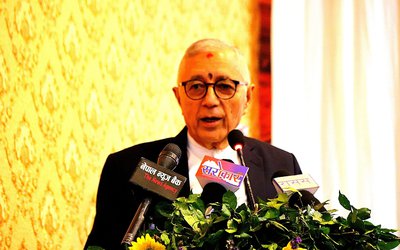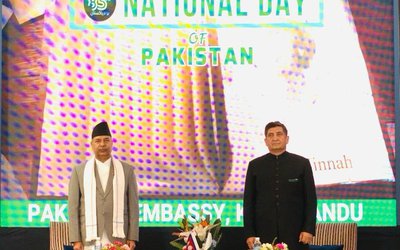Two years ago, there were two, Monkey’s Puzzle trees at our house near Pashupati temple. My father , a constitutional expert, had brought them from a nursery in Godavari, in hopes of more greenery and scaring away the temple monkeys with the needles on the leaves.
As soon as these trees were planted, a stream of disapprovals, the vilest ones from our relatives, headed his way, telling us that the trees bought bad luck to the house, as they were in the front yard, and that their roots would damage the house and the walls once they grew. Tired of these comments, one fine day, after six years, my father got two men to remove the beautiful trees from the house’s porch. This event demonstrates the kind of mentality the people of Kathmandu have. Because of such attitude, Kathmandu cannot be a green and good city. This must change.
Most people who inhabit the Valley are not its original inhabitants. In fact, when only the original quarter of today’s inhabitants lived in the Valley, it was a proper city – planned well and beautiful. It had a distinct architecture, functioning streets and pavements, well-preserved stupas and temples, surplus amounts of public parks and lands, and an effective waste disposal system. However, as the population grew, the government wasn’t able to keep with the growing needs and maintain stability. Once the newcomers arrived from outside the Valley, hoping for better jobs and payments, the orderliness of the city was further destroyed. And today, Kathmandu, the most ancient capital of this region, stands in a worse position as an ancient city.
In Kathmandu, people have the least regards for city life and urban civilization. They are unaware. They are not living and acting like city-dwellers. They are unwilling to pay city taxes. Instead of giving space for more trees and plants, people decide on building bigger houses and bigger garages for bigger cars. No one has the least bit of trouble to throw that plastic outside the window or to spit in the sidewalks. No one has any respect for the city roads, highways, or public properties; people park their cars wherever they like and wouldn’t think twice before extending their porches a few meters into public space.
The government, too, has lost control of the city. There are no divisions between residential, educational, commercial, or parking areas around the city. If one has the money, one can build anything, anywhere. People can randomly build factories or start up shops without anyone interfering, as there are no laws that prohibit such acts. Unlike other, well-going cities, Kathmandu doesn’t have a proper system of disposing trash either, let alone separating it into recyclable or biodegradable trash.The government hasn’t made an effort to emphasize the usage of public vehicles while the number of private vehicles on the streets soars.No funds have been organized to specifically address the needs of the elderly, of little kids, or of women.
In the end, there need not be major changes made for Kathmandu to be a better city. Specific problems need to be addressed, and the state of the city will improve dramatically. Even small things, such as building proper sidewalks, introducing more parks and public spaces that are maintained regularly, or creating a waste disposal system, can significantly improve the conditions we see today around the city. The people, too, need to start acting like citizens who live in the capital of a country, take responsibility for their actions, and be more open-minded.After all, as Shakespeare said, “What is the city but the people?”
- Highlights of KUSL’s Launching Ceremony
- Aug 17, 2014
- Labour Force Leaving The Country
- Mar 24, 2014
- Thinking about Nepal’s Think Tanks
- Nov 10, 2013
- The five years’ BBM-LLB Course of the Kathmandu University Law School
- Sep 13, 2013
- JUDICIARY: Judging Judges
- Aug 30, 2013
















